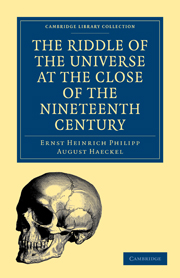Book contents
- Frontmatter
- Contents
- PREFACE
- AUTHOR'S PREFACE
- CHAPTER I THE NATURE OF THE PROBLEM
- CHAPTER II OUR BODILY FRAME
- CHAPTER III OUR LIFE
- CHAPTER IV OUR EMBRYONIC DEVELOPMENT
- CHAPTER V THE HISTORY OF OUR SPECIES
- CHAPTER VI THE NATURE OF THE SOUL
- CHAPTER VII PSYCHIC GRADATIONS
- CHAPTER VIII THE EMBRYOLOGY OF THE SOUL
- CHAPTER IX THE PHYLOGENY OF THE SOUL
- CHAPTER X CONSCIOUSNESS
- CHAPTER XI THE IMMORTALITY OF THE SOUL
- CHAPTER XII THE LAW OF SUBSTANCE
- CHAPTER XIII THE EVOLUTION OF THE WORLD
- CHAPTER XIV THE UNITY OF NATURE
- CHAPTER XV GOD AND THE WORLD
- CHAPTER XVI KNOWLEDGE AND BELIEF
- CHAPTER XVII SCIENCE AND CHRISTIANITY
- CHAPTER XVIII OUR MONISTIC RELIGION
- CHAPTER XIX OUR MONISTIC ETHICS
- CHAPTER XX SOLUTION OF THE WORLD-PROBLEMS
- INDEX
CHAPTER XIX - OUR MONISTIC ETHICS
Published online by Cambridge University Press: 05 August 2011
- Frontmatter
- Contents
- PREFACE
- AUTHOR'S PREFACE
- CHAPTER I THE NATURE OF THE PROBLEM
- CHAPTER II OUR BODILY FRAME
- CHAPTER III OUR LIFE
- CHAPTER IV OUR EMBRYONIC DEVELOPMENT
- CHAPTER V THE HISTORY OF OUR SPECIES
- CHAPTER VI THE NATURE OF THE SOUL
- CHAPTER VII PSYCHIC GRADATIONS
- CHAPTER VIII THE EMBRYOLOGY OF THE SOUL
- CHAPTER IX THE PHYLOGENY OF THE SOUL
- CHAPTER X CONSCIOUSNESS
- CHAPTER XI THE IMMORTALITY OF THE SOUL
- CHAPTER XII THE LAW OF SUBSTANCE
- CHAPTER XIII THE EVOLUTION OF THE WORLD
- CHAPTER XIV THE UNITY OF NATURE
- CHAPTER XV GOD AND THE WORLD
- CHAPTER XVI KNOWLEDGE AND BELIEF
- CHAPTER XVII SCIENCE AND CHRISTIANITY
- CHAPTER XVIII OUR MONISTIC RELIGION
- CHAPTER XIX OUR MONISTIC ETHICS
- CHAPTER XX SOLUTION OF THE WORLD-PROBLEMS
- INDEX
Summary
Monistic and dualistic ethics. Contradiction of pure and practical reason in Kant. His categorical imperative. The neo-Kantians. Herbert Spencer. Egoism and altruism. Equivalence of the two instincts. The fundamental law of ethics: the Golden Rule. Its antiquity. Christian ethics. Contempt of self, the body, nature, civilization, the family, woman. Roman Catholic ethics. Immoral results of celibacy. Necessity for the abolition of the law of celibacy, oral confession, and indulgences. State and Church. Religion a private concern. Church and school. State and school. Need of school reform.
The practical conduct of life makes a number of definite ethical claims on a man which can only be duly and naturally satisfied when they are in complete harmony with his view of the world. In accordance with this fundamental principle of our monistic philosophy, our whole system of ethics must be rationally connected with the unified conception of the cosmos which we have formed by our advanced knowledge of the laws of nature. Just as the infinite universe is one great whole in the light of our monistic teaching, so the spiritual and moral life of man is a part of this cosmos, and our naturalistic ordering of it must also be monistic. There are not two different, separate worlds—the one physical and material, and the other moral and immaterial.
- Type
- Chapter
- Information
- Publisher: Cambridge University PressPrint publication year: 2009First published in: 1900



